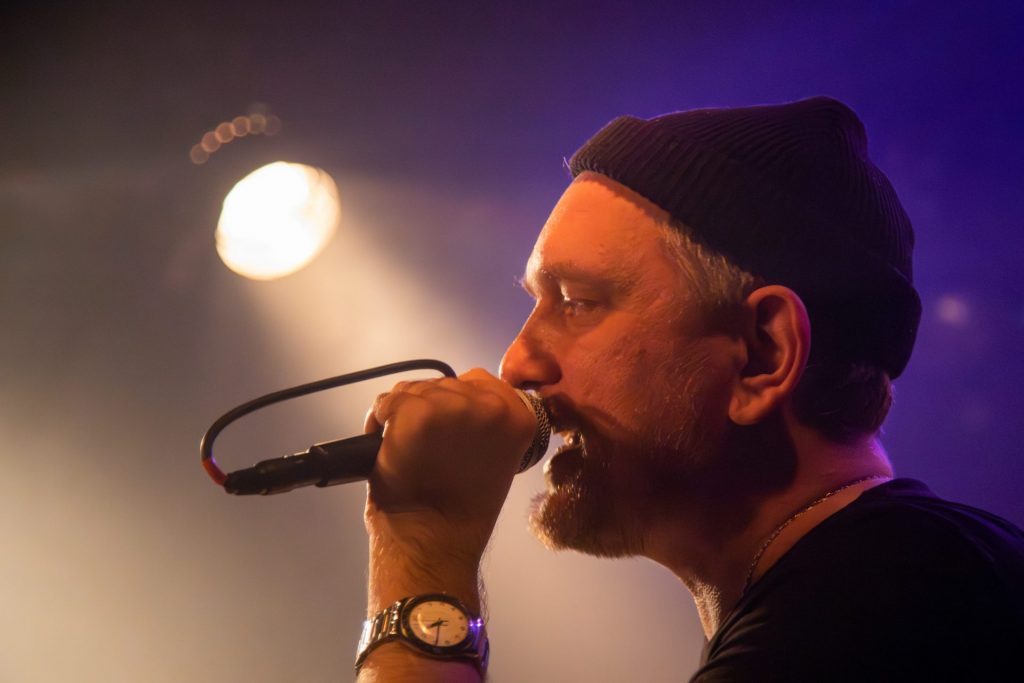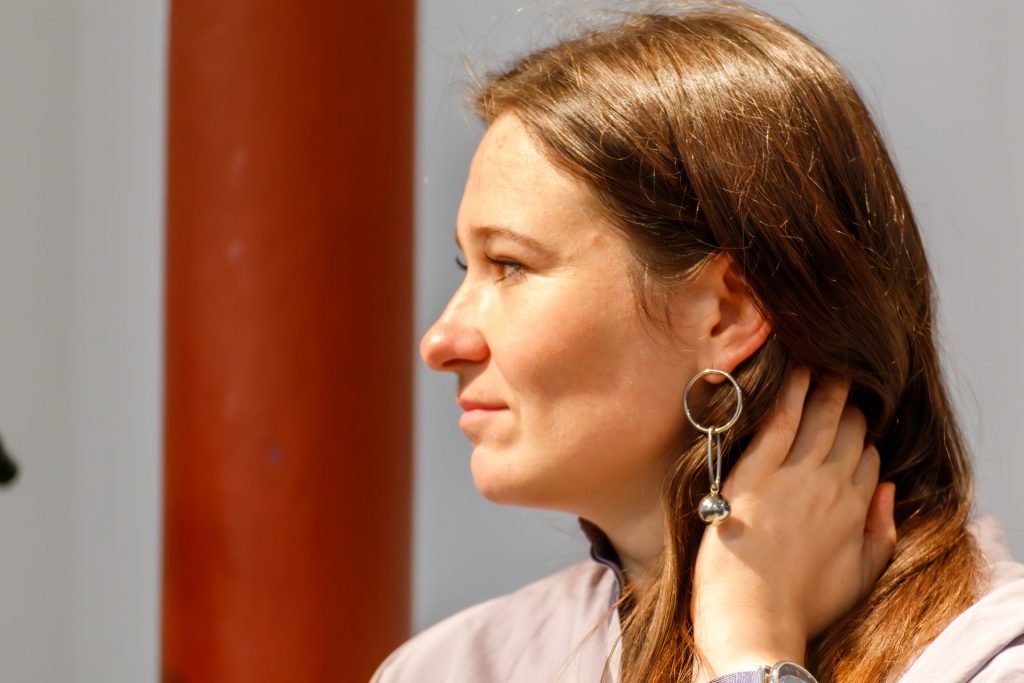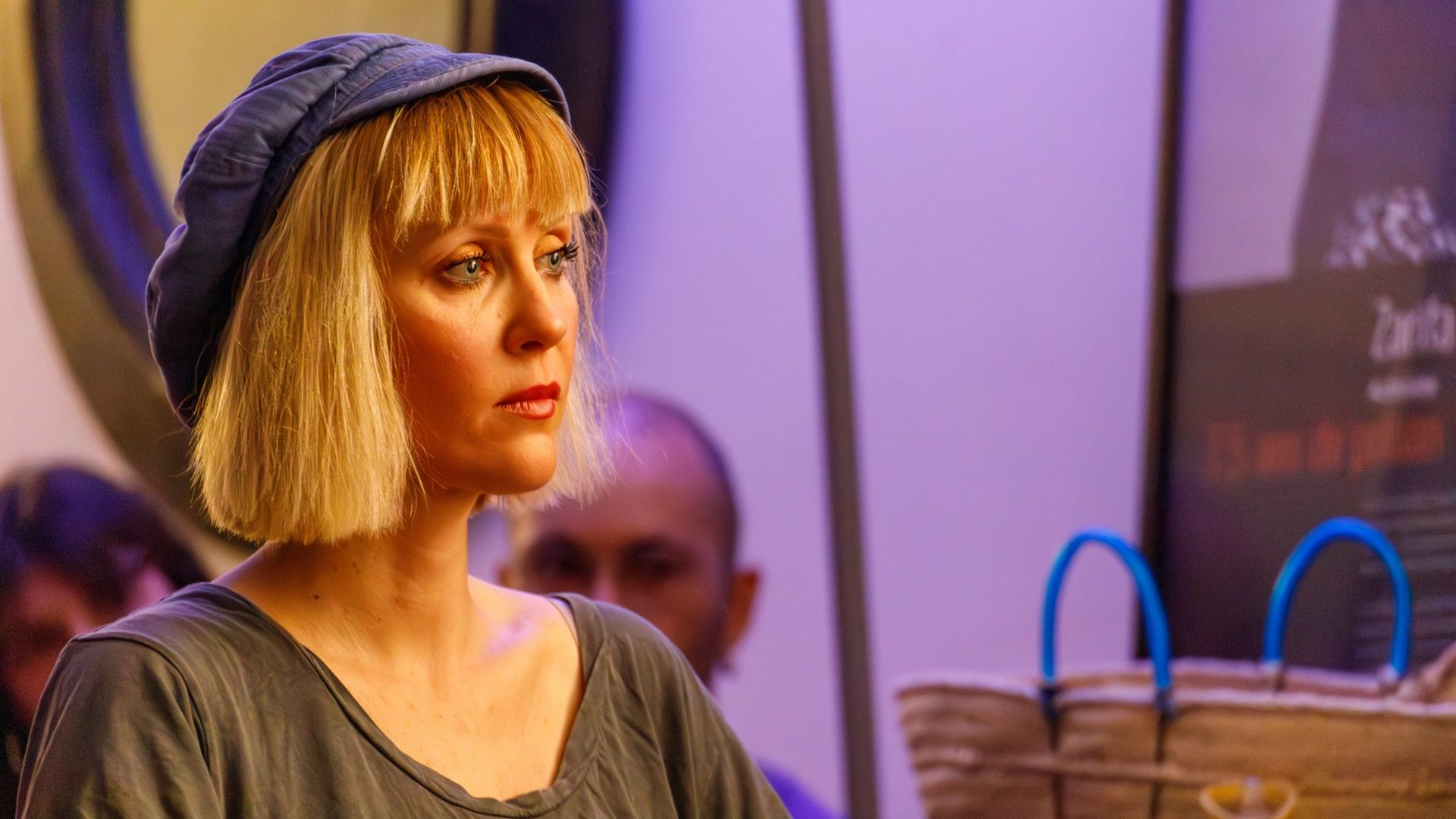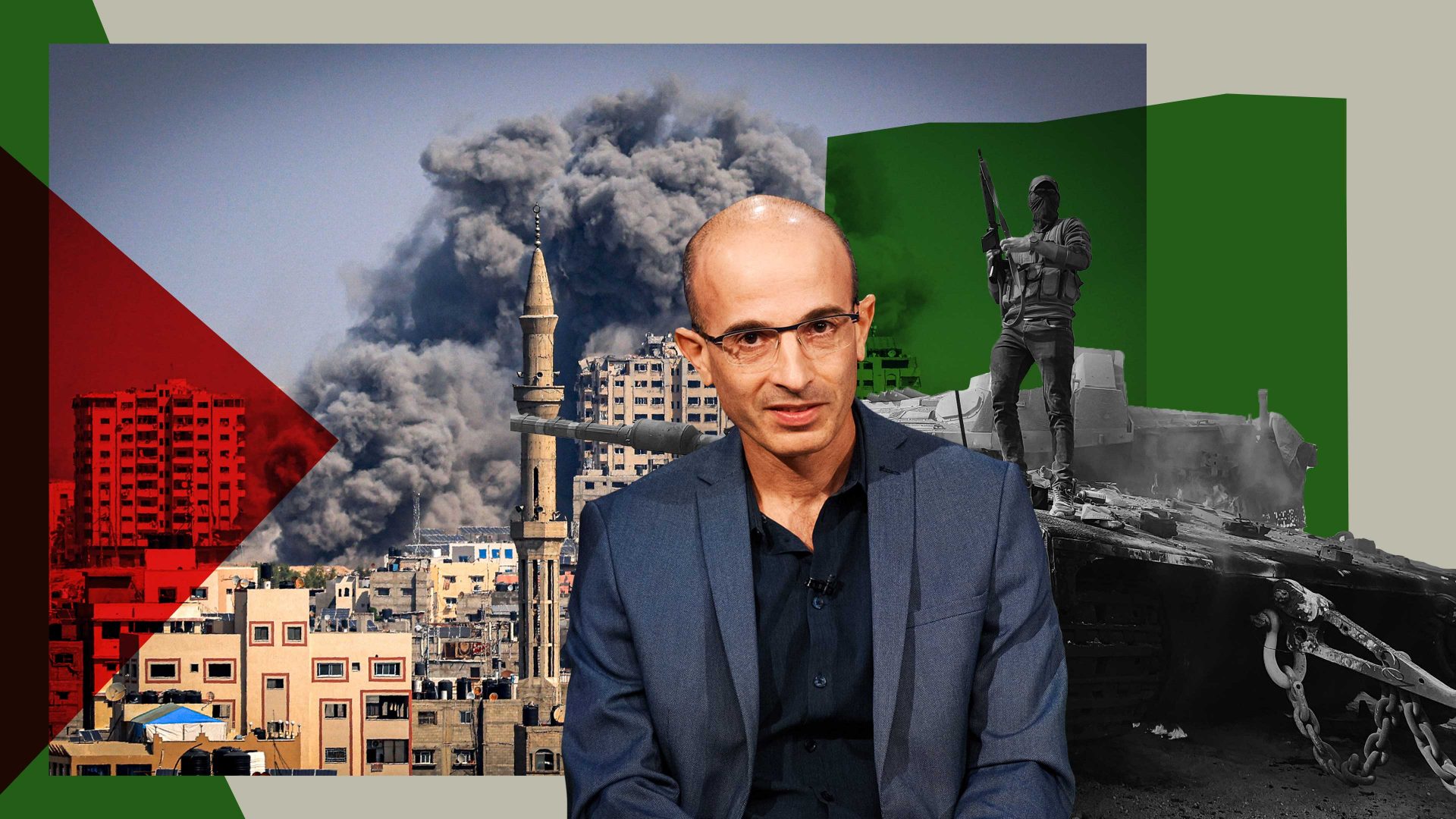Marc Chagall, Ivan Bunin, Andrei Tarkovsky and countless others were part of a wave of Russian exiles who fled the country during the 20th century to escape persecution by the Soviet authorities. Now, a new generation of artists has followed in their footsteps, seeking refuge in Paris from the Kremlin regime.
Driven from their homeland by their refusal to support the Russian invasion of Ukraine, they are grappling with the challenges of adapting to a new reality. Russia, for them, does not equal Vladimir Putin – this is the idea that they’re defending, expressing in their work and embodying.
Katia Demina

Just like every other Wednesday for the past year and a half, a street by the Pompidou Centre is full of Ukrainian flags. Organised by the Ukrainian community in Paris, this march takes place every week and is a poignant reminder of the ongoing war in their homeland. A lonely figure in the sea of blue and yellow, Katia Demina, an artist from Moscow, drapes herself in a white-and-blue flag. Devoid of its red stripe, this is the flag of a new, bloodless Russia embraced by the opposition to the regime.
Back home, Katia specialised in creating portrait dolls out of cotton. In recent years, she designed a one-of-a-kind series of Christmas tree ornaments featuring cotton portraits of famous writers. The doll she brought to the rally is a miniature copy of Vladimir Putin, a tiny noose around his neck. As Katia retrieves it from her bag, she accidentally drops it on the ground and laughs: “Look! Putin’s regime has fallen!”
“Before the war, I knew our government was authoritarian, corrupt and only getting worse, but then we attacked Ukraine… Suddenly, I realised that I was living in a fascist state. I couldn’t bear to walk the soil of a country that had waged a war against a completely peaceful sovereign state. It was my personal protest – I decided I wouldn’t return until the regime changed, or until the situation required my involvement. Throwing bricks – I’m all for it!”
Katia’s priority was to get her 16-year-old son, who was approaching draft age, out of the country. As they packed their bags, they couldn’t imagine just how long their exile would last.
“At first, I thought someone in Putin’s entourage would just get rid of him. A snuffbox to his head, that’s what I lived for!” It’s a reference to Russia’s Emperor Paul I, killed by a blow to the temple with a snuffbox.
With the regime still firmly in power, and the news from home consistently reporting new political prisoners, Katia sank into despair. Chanting along with Ukrainians, she screams “Russia is a terrorist!”, and then admits she can’t imagine never returning. “I hold on to that hope. I often daydream about the war being over – how I’ll go back, cover my friends with hugs and kisses, we’ll cry, drink and sing together. That’s what keeps me going.
“I do appreciate France – what’s not to like? But severing ties with that piece of Eurasia I hold dear, the people I love – I just can’t do it. I don’t dwell on the Russians they label as ‘Putin-loving assholes’. I don’t know those people. I know my Russia – the one that leaves little anti-war notes in public restrooms, the only place they can’t get caught. A guy I know, in his 60s, had his face pushed into the ground and was fined for writing ‘Glory to Ukraine’ on a bus stop. He got lucky – they eventually dropped the initial charges of extremism. This was a year ago. Today he wouldn’t get off that easily. These people are my Russia. And I miss it.”
Walking at the tail of the procession, Katia confesses that she doesn’t always feel welcome at the Ukrainian rallies. “They’d say to me, ‘What are you waving your flag here for?’ But I always come back. Because there are also those who thank me for coming.
“And if people don’t believe there are Russians who are against the war, this is my way of saying: ‘Look, here I am, I exist’. I know there are many wonderful people out there who are doing much braver things, things I don’t have the strength or the brains for. But this is what I can do, and I’m doing it.”
Naum Bleek

In a modest studio in the centre of Paris, Naum Bleek, a 43-year-old veteran of the Russian hip-hop scene, finishes up his rehearsal. It’s a space provided by the Atelier des Artistes en Exile, a local association that helped him move to Paris in the summer of 2022. As he contemplates his plans for the day, the thought of procuring some buckwheat for dinner provides a small but comforting link to the familiar world he left behind.
“I had never wanted to leave Russia, despite all the difficulties,” Naum recalls. “I have always found ways to resist – I protested, voted, campaigned. But after February 24 (2022), I felt too disgusted to stay in that fascist state. Most importantly, I couldn’t carry out my function as a poet. My job is to document the unfolding events in my poetry, and to be able to do that, I had to leave.”
The decision meant he had to give up his apartment, his plans, and mainly his language – the most essential tool for a poet. He gives an occasional performance for the Russian community in Paris, but it’s not the same as performing in front of packed concert venues back home.
“I miss my language, and I miss my audience, yet the very reason I left was to be able to address the Russian-speaking public. Though at times I feel like there’s no point. All Russian people want is to be left alone. When the invasion started, many just shrugged their shoulders, repeating, ‘What can we do?’ But as we say in Russia, ‘drop by drop, water wears away stone’. It’s crucial to keep wearing away the stone of war with every word of truth we utter.”
Writing, however, does not come easy to Naum these days. Constant anxiety, a new language environment and the problems that come with moving to a new country are all powerful distractions. To make ends meet, Naum took a job in a Burger King. Being used to earning his living with his music and the brand agency he established, he doesn’t find flipping burgers particularly exhilarating, but he has a philosophical outlook on things.
“This is actually a pretty funny story,” he chuckles, sitting with his back to a drum kit and some speakers. “Back in Russia I had a fight with the Burger King staff and vowed never to set foot in one of their restaurants again. Then, when I was job-hunting in Paris and distributing CVs in fast food restaurants, because my French skills weren’t enough to get a qualified job, only one out of over 30 restaurants called me back – and it was the only Burger King from the list.”
There are days when Naum feels nostalgic, but he fights the sentiment. “There’s an urban legend that says the Russian dissident poet Vladimir Voinovich, when he was being expelled from the USSR, received a box labelled ‘Antinostalgine’ from his friends. The instructions were to open the box when he felt particularly homesick. When he eventually opened it, he discovered a set of records featuring speeches by Leonid Brezhnev. For me, ‘Antinostalgine’ is Twitter – the portal into the horrors happening in Russia.”
As he’s leaving the studio to buy buckwheat, he stops to pet a stray cat. “The optimist in me wants to believe that a day will come when the war and Putinism will cease to exist. We will embark on a journey of self-reflection, of fully comprehending the horrors our country has wrought, seek forgiveness from the world and pay reparations to Ukraine. My main motivation is to bear witness to those times and capture them in my art.”
Maria Chuprinskaya
Nestled within the historic complex of the Recolette Residence, a renovated military hospital built by the Franciscan Order in the 17th century, lies a unique refuge for foreign researchers and artists. Among its occupants are actor and film producer Maria Chuprinskaya and her family. Sitting under a fig tree in the silence of the courtyard, Maria smokes one cigarette after another, recalling the events that brought her here.
“At the time, I felt very little and wasn’t making any decisions. When my husband said we were going to France, I remember replying, ‘That’s great, Vlad, take the children and go.’ As for me, I wanted to stay. I felt like a member of the orchestra on the Titanic, deciding to go down with the ship. I wanted to at least throw one Molotov cocktail somewhere near the Spasskaya Tower. Eventually, my husband brought me to my senses, saying that I needed to be there for our children.”
Maria’s history of activism began back in 2018 and quickly earned her close attention from law enforcement. At the time, she campaigned for the release of the Ukrainian film-maker Oleg Sentsov, sentenced by the Russian authorities to 20 years in prison on trumped-up charges.
When Sentsov declared a hunger strike, Maria printed leaflets about his case and started handing them out to people in the street. “For the Fifa World Cup we translated our leaflets into Spanish, English and French, and distributed them to football fans. We were shooting a video with some 40 Brazilian fans shouting, ‘Oleg Sentsov must live!’ when we were first roughly detained.”
After that, she was on the security services’ radar. “Once the police came to my house while I wasn’t at home and talked to my daughter through the door. They explained what they would do to me if I misbehaved, and it terrified her. She cried every time I wanted to step outside. I would tell her, ‘I’m only going to get some bread’, but she wouldn’t believe me, she’d say, ‘No, Mom, you’re going to some rally again’.”
On February 24 2022, with a sign that read “No to war, Hands off Ukraine”, she headed to the city centre. As most of her fellow activists had already been detained during their solo pickets, she decided her safest bet was to walk around with her little banner.
“I was monitoring things from the corner of my eye. When I saw something, I would quickly fold my sign and then raise it back up further down the street. It was all like in a dystopian scenario – the entire city centre was full of people in black. Police vans were everywhere. Every time someone attempted one of the symbolic gestures people came up with at that time, like tying a green ribbon or holding up an icon, they were immediately detained.”
Leaving Russia has brought shaky psychological relief. “It’s been one endless nightmare. To this day, I can’t accept the reality. What’s happening is killing me. But I have my children, and it’s my responsibility to be their mother. This is my tie to the real world.”
With a distinct shudder, Maria confesses that today the thought of returning to Russia makes her ill. “I try to picture myself there, in the Moscow of 2023, but I can’t. I’d love to go back once there’s no more dictatorship, no more fascists, no more empire, but this process will likely take longer than my lifetime. And even if it happens sooner, would they need a 70-year-old me to help them rebuild the country? I don’t think so. I have done what I could, and then, it will be time for young people to act.”
Elena Gordienko

After a long day of teaching Russian theatre at the Sorbonne Nouvelle, the researcher Elena Gordienko sinks with relief on to a peaceful bench in the Jardin du Luxembourg. For her, the move to Paris was a return to a city she knows well – she was a student here several years ago. While many of her Russian peers chose to settle in France after their studies, Elena was eager to get back to Moscow.
“The 2010s marked a boom in Russian contemporary theatre,” Elena muses, a twinkle of longing in her eyes. “Theatre remained a sanctuary where you could speak freely. The outbreak of the war put an end to that, and I knew I had to leave.”
In Moscow, she had felt as if she was fulfilling a social mission by engaging students in candid discussions, and once in Paris she felt adrift. “My sense of purpose was gone, I felt very empty. What was I to do in France? The solution I devised was simple: I could do what those back home couldn’t”.
Not long ago, the Russian playwright Svetlana Petriychuk and director Evgenia Berkovich faced arrest, accused of promoting extremism through their play, Finist, the Brave Falcon. Along with her university colleagues, Elena organised a screening of the play in Paris. “Some might call it futile,” she says, “but for the authors, knowing that people watched and cared about the play was extremely important. They could feel support and solidarity. That’s what drives me to keep working.”
For Elena, artistic expressions of protest against Russian aggression are a necessary part of any anti-war movement. “Marching and screaming slogans is all very well, but it inevitably becomes monotonous,” she says. “Artists feel the need to craft a lens through which one can illuminate the intricacies of this horror with more subtlety and precision.” This is why she felt compelled to organise the “Echo of Lubimovka” festival in Paris.
Lubimovka, an independent festival of new Russian-language drama, was originally established in Russia, but an oppressive degree of censorship caused the organisers to shut it down. They still published their shortlist, which ignited a grassroots movement called “Echoes of Lubimovka”, which included the reading of selected plays held in cities across Europe and Asia. Following each of the eight Parisian performances, all of which condemned the war, there was a highly emotional discussion.
For French families of Russian émigrés this was a chance to understand a little better the unspoken pain carried by their loved ones. Later one of these plays, Vanya is Alive, went up to the Edinburgh Festival, where it gained international attention.
“I have just learned to plan as far as a month in advance,” Elena says. “It’s really hard for me to think about going home. I would love to, of course – as soon as it’s once again possible to do some good without putting anyone at risk. But you know, sometimes the thought comes, ‘What if what I miss is no longer there?’”



